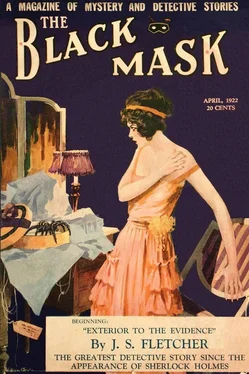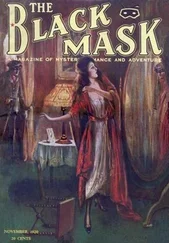J. Fletcher - The Black Mask Magazine (Vol. 5, No. 1 — April 1922)
Здесь есть возможность читать онлайн «J. Fletcher - The Black Mask Magazine (Vol. 5, No. 1 — April 1922)» весь текст электронной книги совершенно бесплатно (целиком полную версию без сокращений). В некоторых случаях можно слушать аудио, скачать через торрент в формате fb2 и присутствует краткое содержание. Город: New York, Год выпуска: 1922, Издательство: Pro-distributors Publishing Company, Жанр: Детектив, на английском языке. Описание произведения, (предисловие) а так же отзывы посетителей доступны на портале библиотеки ЛибКат.
- Название:The Black Mask Magazine (Vol. 5, No. 1 — April 1922)
- Автор:
- Издательство:Pro-distributors Publishing Company
- Жанр:
- Год:1922
- Город:New York
- ISBN:нет данных
- Рейтинг книги:3 / 5. Голосов: 1
-
Избранное:Добавить в избранное
- Отзывы:
-
Ваша оценка:
- 60
- 1
- 2
- 3
- 4
- 5
The Black Mask Magazine (Vol. 5, No. 1 — April 1922): краткое содержание, описание и аннотация
Предлагаем к чтению аннотацию, описание, краткое содержание или предисловие (зависит от того, что написал сам автор книги «The Black Mask Magazine (Vol. 5, No. 1 — April 1922)»). Если вы не нашли необходимую информацию о книге — напишите в комментариях, мы постараемся отыскать её.
The Black Mask Magazine (Vol. 5, No. 1 — April 1922) — читать онлайн бесплатно полную книгу (весь текст) целиком
Ниже представлен текст книги, разбитый по страницам. Система сохранения места последней прочитанной страницы, позволяет с удобством читать онлайн бесплатно книгу «The Black Mask Magazine (Vol. 5, No. 1 — April 1922)», без необходимости каждый раз заново искать на чём Вы остановились. Поставьте закладку, и сможете в любой момент перейти на страницу, на которой закончили чтение.
Интервал:
Закладка:
“You think Sir Cheville oughtn’t to marry?” asked Letty.
“I don’t say that Sir Cheville oughtn’t to marry, not I!” answered Mr. Getherfield. “But I think he might have done it some years earlier! Here’s Mrs. Stanbury, his sister-in-law, been led to expect that her one chick was to inherit the baronetcy — a very old title — and at the last moment Sir Cheville elects to put Marston’s chances in jeopardy. And of all the women I know,” added the old man with a chuckle, “Mrs. Stanbury is the hottest-tempered, and the most determined, and the most implacable, and under a different condition of things she’d have moved heaven and earth to get her baronet brother-in-law shut up in a lunatic asylum!”
“Marston says she was fearfully angry with Sir Cheville,” remarked Letty. “He left her telling Sir Cheville no end of her mind.”
“She could — I’m sure!” said Mr. Getherfield. “Well, we seem to be living in strange times, hereabouts. You’ll be hearing that I’ve run away with somebody’s cook next.”
Letty went to bed that night in the room which was always kept for her at Foxden Manor, and she slept the sleep which follows on sudden relief from anxiety that has no very definite cause. When she joined the old man at breakfast next morning, she was in her usual good spirits. She forgot all the fear which had oppressed her the previous evening — and she forgot Bradwell Pike. But a word from Mr. Getherfield, spoken as they made ready for departure, recalled him.
“I’m going to have a quiet chat with your father this morning, my dear,” said the old man, as he stood with Letty in the porch, waiting for his cob to be brought round. “I’m going to advise him — very quietly — not to trust that fellow Pike too much. If he says anything to you, afterwards, tell him that you told me all that Pike said to you last night. That’s best — don’t have any secrets from your father.”
“I never had one. until yesterday, Godfather,” responded Letty. “And I meant to tell him I’d been behind that curtain and what I heard. He knows — quite well — about Marston.”
She was wondering all the way down the valley if she would find her father at the mill, whither she meant to go before returning home; if so, she was going to tell him straight out, in her godfather’s presence, what her trouble had been. But before she and Mr. Getherfield came in sight of the manufacturing village and its tall chimneys, a man, striding rapidly down the hillside from the moors, lifted a hand and stopped them. Letty recognised him as one of Sir Cheville’s moor-rangers. He came up to Mr. Getherfield’s stirrup, looking from him to Letty with a face full of grave concern.
“Have you heard it, sir?” he asked excitedly. “Sir Cheville’s dead! Found dead on the moors, this morning, by our head keeper. And the police will have it there’s been foul play. Murder!”
(To be continued next month.)
The Finger of Guilt
by J. J. Stagg
I
There was, at the time, an epidemic of jewelry robberies. The pestilence had attacked Scofield’s six times in four months; but the disease never “took.” The six hold-ups failed and in every instance the robbers were caught. Scofield’s had a system of locks and alarms that appeared to be unbeatable.
Then along came Judson Farris.
Scofield’s occupies the ground floor of a building on Maiden Lane. The store takes care of the retail business. To the rear of the store is a private office in which Mr. Scofield himself sells jewelry at wholesale; he also serves his more extravagant retail clients.
Judson Farris entered the shop, handed a letter to one of the clerks and asked that it be delivered to Mr. Scofield. The clerk walked to the rear of the store and entered the private office. A few minutes later he returned and announced that Mr. Scofield would see Mr. Farris at once.
Farris stepped into the private office, and as he closed the door, he noted absently that there was a latch attached to it. The latch was unique in appearance. It looked somewhat like the disc of a safe. When the mechanism was set, it was necessary only to close the door in order to destroy the combination. The door could then be opened only if the brass knob on the latch was turned and twisted in a certain way. To be sure, the combination was a simple one. Mr. Scofield, when ushering a person out of the room, could manipulate the latch so speedily that the client seldom became aware that he had been locked in.
Farris, however, was little concerned with locks. He appeared to be quite indifferent to his surroundings. Such indifference was easy to affect, for the room was so sparsely furnished that everything could be taken in at a single glance.
Running parallel with the front wall was a low mahogany counter which divided the room approximately in half. In the space before the counter were three chairs; behind the counter were two flat-top desks. Two vaults were built into the rear wall.
Scofield, who had been seated at one of the desks, came forward to the counter and stretched out a hand in greeting. He said he was always glad to be of service to any of Mr. Moffat’s friends. (Scofield was a member of the yacht club of which Moffat was president; it was Moffat who had written the letter of introduction for Farris.)
Farris said he wanted to buy a lavalliere. Scofield inquired as to the amount Farris wished to spend and Farris replied he didn’t care to go over ten thousand.
Scofield went into the right vault, the door to which was open. The walls of the vault were lined with small drawers. Scofield pulled out two of the drawers. As he returned to the office, he glared frankly at Farris, who had half-turned and was looking up at a picture.
Scofield considered himself a shrewd judge of character. Farris was a tall, well-groomed man with a collar-ad face.
“Shallow,” mused Scofield, “but trustworthy and prosperous.”
The two trays were placed upon the counter. In one of them were a dozen platinum chains; in the other, a dozen diamond pendants.
“These are assorted lots,” explained Scofield. “Please indicate your choice of the pendants, so that I can bring you another tray of pendants which are made along the lines of the one you like.”
Farris made his decision quickly. He chose a pendant which consisted of four graduated blue-white diamonds set in a small petal design. “You need bring no other samples, Mr. Scofield. This is one of the prettiest drops I have ever seen.”
Farris thereupon made his choice of a chain. Scofield took the chain and the pendant out of the trays, ran the chain through the loop at the top of the pendant and dangled the lavalliere before Farris.
“How much will that set me back?”
Scofield consulted the tags. “Seventy-three hundred, Mr. Farris. Eight hundred for the chain and sixty-five hundred for the drop.”
Farris remarked that he had with him a certified check for ten thousand and that if Mr. Scofield cared to, he could call up the Second National for verification. The deal seemed to be completed. Then Farris changed his mind.
“I think that yellow diamonds would look prettier on a platinum chain,” he said. “Could you let me see—?”
“Certainly,” replied Scofield.
He picked up the two trays and took them into the vault. After a moment he came back and placed a pendant in the palm of Farris’ right hand. “This is the exact counterpart of the one you chose, except that it has yellow stones.”
Farris looked at it a moment and then said, “Put it on the chain, Mr. Scofield, so that I can see how it—”
Scofield glanced up sharply. “I left the platinum chain and the blue-stone pendant with you, Mr. Farris.”
Читать дальшеИнтервал:
Закладка:
Похожие книги на «The Black Mask Magazine (Vol. 5, No. 1 — April 1922)»
Представляем Вашему вниманию похожие книги на «The Black Mask Magazine (Vol. 5, No. 1 — April 1922)» списком для выбора. Мы отобрали схожую по названию и смыслу литературу в надежде предоставить читателям больше вариантов отыскать новые, интересные, ещё непрочитанные произведения.
Обсуждение, отзывы о книге «The Black Mask Magazine (Vol. 5, No. 1 — April 1922)» и просто собственные мнения читателей. Оставьте ваши комментарии, напишите, что Вы думаете о произведении, его смысле или главных героях. Укажите что конкретно понравилось, а что нет, и почему Вы так считаете.












